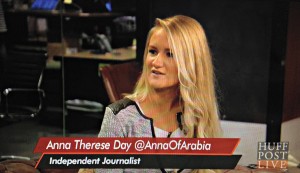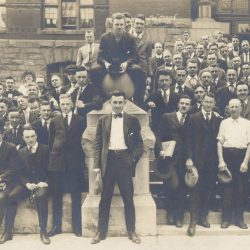Anna Therese Day ’10: Freelancer Advocate

Anna Therese Day was interviewed about the plight of Syrian refugees on HuffPost Live’s WorldBrief in April. Courtesy of Huffpost Live.
For Anna Therese Day ’10, going the freelance route in pursuit of a journalism career wasn’t so much a choice as it was a calling.
“Through my mentors and professors at the UW, I understood very clearly the kinds of compromises I would have to make to work in mainstream media,” says Day. With her passion for media and social movements, and coming of age in a post-9/11 America, she became a freelance foreign correspondent, covering the Arab world and the continuing Israeli-Palestinian conflict. Her stories have focused on American foreign policy in the Middle East, women’s issues, and regional youth movements.
Day’s work has been featured in a variety of media outlets, including Al Jazeera English, the BBC, CNN International, NPR, the Huffington Post, and numerous blogs. And she was awarded a Fulbright Fellowship in 2013, became a UN Press Fellow in 2012, and was named one of Google Zeitgeist’s Top 30 Great Young Minds of Our Time in 2011.
Day is also a founding member of the Frontline Freelance Register (FFR), the first and only representative body created and run by and for freelancers. Launched in June 2013, FFR is open to all freelance journalists who are working in conflict or foreign reporting. Because freelancers are a cheaper option for news outlets to use, and these same outlets are under no legal obligation to invest in the safety of freelancers or insure them, Day says that such an organization was a necessity.
“The hope for FFR is to address both short-term needs — communications equipment, safety training, and insurance costs — as well as long-term industry policies regarding freelancers,” Day explains. “Our aim is to ensure that freelancers have a voice at the table in order to protect journalists and preserve or improve the quality of international news.”
FFR already has more than three hundred members from around the world. Day sees that as a real breakthrough, because freelancing is notoriously cutthroat, and reporters often see each other as competition. “When I was first starting out, one of my UW professors who worked for a time as a freelance journalist in the Middle East, Jennifer Loewenstein, gave me invaluable advice: trust no one,” Day says.
But she got caught up in the camaraderie produced by covering the Arab Spring in 2010–11, and she didn’t want to believe her teacher’s advice — “until I got burned again and again and again,” she says with a laugh.
Day also gleaned another valuable tip from Loewenstein as she watched her act as a role model for students: “She showed me the value of investing in others.” So Day decided to cling dearly to her most trusted colleagues and to care about the professional development of freelancers.
“This approach has paid off in more ways than I could’ve imagined,” she says. “There isn’t a day when I’m on assignment that I’m not thankful for this community of freelance journalists and aid workers who are my ongoing support network, both personally and professionally.”
Published in the Summer 2014 issue


Comments
No comments posted yet.